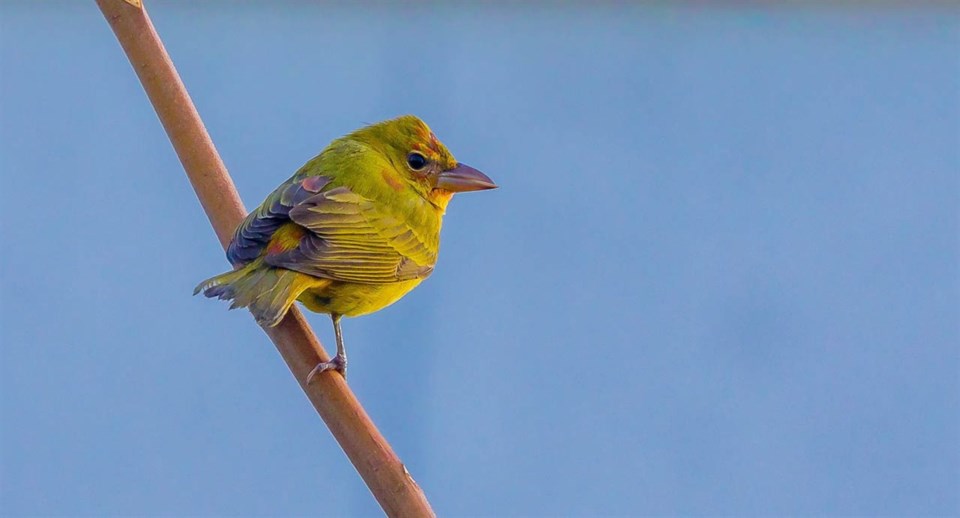 Photo: The Canadian Press/HO-Melissa Hafting
Photo: The Canadian Press/HO-Melissa Hafting
Bird watchers are flocking to British Columbia's Lower Mainland after a wayward summer tanager was spotted pecking at peanuts on a south Â鶹´«Ã½Ó³»balcony over the weekend.
Saturday's sighting was the first time a summer tanager has been recorded in the Metro Â鶹´«Ã½Ó³»area, and only the sixth time for all B.C., said Melissa Hafting, who runs a rare bird blog.
"He's bringing a lot of joy to birders in the area," Hafting said in an email. "He has a small bill deformity but is eating very well."
Summer tanagers typically winter from central Mexico to Bolivia and Brazil, and their summers are usually spent around the southeastern United States.
The juvenile male is likely off course thanks to reverse migration, a phenomenon where young birds migrate in the opposite direction thanks to what is believed to be faulty genetic programming, Hafting said.
The rare sight has attracted birders from as far away as Â鶹´«Ã½Ó³»Island, Kelowna and Washington state, she added.
Photographs of the Â鶹´«Ã½Ó³»visitor show a medium-sized songbird with brilliant yellow feathers and splashes of bright red around its face. The top section of its thick, stubby bill curves slightly to the left.
Wendy Kahle spotted the bird flitting about her balcony Saturday morning but didn't immediately recognize it.
She said she posted a photo online asking for help identifying the species and within three minutes Hafting called her "super excited" to ask for permission to share the location with the birding community.
"I said, 'Yes, sure. Come on down.' I had absolutely no idea how rare it was and just how much excitement it brought with it," Kahle said.
Since then, between five and 10 people have been outside her home at any given time admiring the tanager, she added.
"Everyone whom I spoke to was just thrilled and so thankful."
Liron Gertsman, 17, was among the first to show up and photograph the tanager.
"It was eating peanuts that the lady who found it had put out on her balcony," said the avid birder, who plans to study ornithology after he finishes high school. "It was even catching some insects. We watched it eat a couple wasps as well."
He described the bird as stunning and said the sighting is likely a once-in-a-lifetime opportunity.
"It makes you feel really small in a way because this bird is in totally the wrong part of its range," Gertsman said. "It makes it a really special thing to see a bird that is so rare in this part of the world."
— Follow @gwomand on Twitter
![]()


